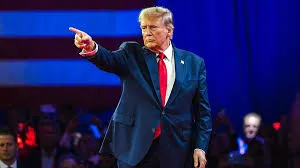
JOURNALIST: - Could you share your assessment of the current stock market?
Mr. TRẦN HOÀNG SƠN: - In the wake of the recent U.S. election, we're observing significant fluctuations in different asset classes. The asset class that has reacted most sharply is the U.S. dollar, which has strengthened considerably. We've also seen a surge in the cryptocurrency market, with Bitcoin reaching $90,000. Meanwhile, the U.S. stock market is showing strong growth.
On the other hand, the Vietnamese stock market and gold are experiencing downward trends. Several factors are contributing to these difficulties for Vietnam's stock market: the rising exchange rate is leading to net sales by foreign investors, and there's a shift of capital from Asia and Southeast Asia back to markets with robust growth, like the U.S., or to alternative assets like Bitcoin.
Currently, most stocks are on a downward trajectory, with selling pressure dominating the VN Index’s trend. This market correction has brought stock prices to more attractive levels, which should eventually draw in new capital.
- What do you see as the similarities and differences between Trump’s policies during his first term and what we might expect this time?
- In my view, there are several differences. In his first term (2016-2020), Trump didn’t announce any major policies in his first year, as he initially focused on domestic issues. It wasn’t until 2018-2019 that he rolled out a strong tax policy targeting China. This time around, he may move more quickly to implement aggressive tax measures, particularly concerning trade.
One of the main concerns is that Chinese goods entering the U.S. might face tariffs as high as 60%, while goods from other countries could be taxed around 20%. During his first term, the "Trump 1.0" tax cycle largely targeted China, with only minor implications for Europe. This allowed Vietnam’s trade surplus with the U.S. to grow. By the most recent month, Vietnam's surplus had reached $11 billion, and for the year, it was about $100 billion, placing Vietnam among the top six exporters to the U.S.
Under "Trump 1.0," countries like Vietnam and Mexico were relatively unaffected and even benefited. However, there is growing concern that Vietnam might not escape unscathed in "Trump 2.0."
- What scenarios do you think we might see under Trump’s second term?
- There are two primary scenarios for U.S.-China relations from 2025 to 2030. If the current tariff levels are maintained, China's export trade to the U.S. could drop below 10%. If tariffs are raised to 60%, Chinese exports to the U.S. might fall to almost 1%. Should the U.S. intensify its focus on China, exports from other countries to the U.S. could also decrease by 20-30%.
In a scenario where the U.S. imposes a 60% tariff on China and 20% on other countries, the global market would see a significant impact, with export figures potentially declining by an average of 40-45% until 2028.
I believe Trump is likely to exert heavier pressure on China while maintaining relatively lighter measures against other countries. The reason is straightforward: if the U.S. imposes strict tariffs on China without having reliable alternative sources of goods, it would lead to higher prices for American consumers, fueling inflation. For Vietnam, this means increasing imports of essential goods from the U.S. while balancing its exports to ensure mutual benefits.
Vietnam's strategic location in Southeast Asia is advantageous. If the U.S. adopts a moderate tariff policy for Vietnam compared to its regional neighbors, it could further pull Vietnam into its orbit, attracting more capital flows that might otherwise go to China or nearby countries like Indonesia, Malaysia, and Thailand.
- How might Trump’s tax policies impact Vietnam's stock market?
- If we look back at 2018, when Trump announced the first round of tariffs on Chinese goods, the Vietnamese stock market also went through a challenging period. Therefore, investors should prepare for the possibility of similar difficulties when Trump takes office in January 2025. Tariff impacts could begin as early as the start of 2025, with the market possibly reacting ahead of time in November and December of the previous year.
I anticipate that the final quarter of this year could see a market trough due to foreign investors’ net selling, which might provide a buying opportunity for those looking to capitalize on short-term recoveries.
- Besides Trump's policies, the U.S. dollar exchange rate is another crucial factor for investors. What are your thoughts on this issue?
- The U.S. dollar has been gaining strength, creating significant pressure on exchange rates. However, I expect the exchange rate to stabilize by the end of the year. The Federal Reserve has already started cutting interest rates, with a further reduction of 25 basis points expected in December and additional cuts anticipated in 2025. If this trend continues, the U.S. dollar may weaken in 2025, allowing the Vietnamese exchange rate to stabilize.
Nonetheless, we need to remain vigilant regarding other factors that could influence Vietnam’s exchange rate beyond the U.S. dollar’s performance.
As the global economy braces for Trump’s return to the presidency, Vietnam faces a mix of challenges and opportunities. Trump's approach to trade, taxation, and international alliances will likely have significant repercussions not only for global markets but for Vietnam's economic landscape as well. In the coming years, Vietnam will need to navigate complex geopolitical currents, balancing its strategic partnerships with the U.S. and other major economies while maintaining a resilient and diversified economy.
Investors should be prepared for a period of market volatility, especially in sectors directly affected by trade policies and currency fluctuations. Despite potential short-term turbulence, Vietnam's strong manufacturing base, advantageous geographic position, and robust trade relationships could provide a solid foundation for long-term growth.




















